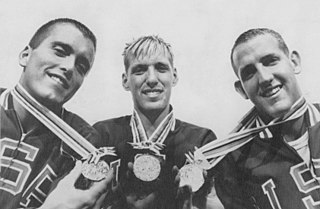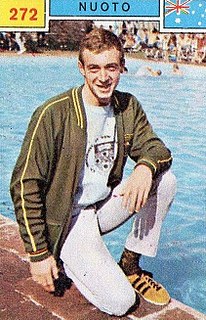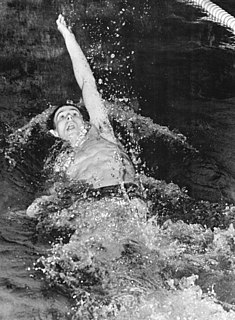
The men's 200 metre backstroke event at the 2004 Olympic Games was contested at the Olympic Aquatic Centre of the Athens Olympic Sports Complex in Athens, Greece on August 18 and 19. There were 36 competitors from 30 nations. Each nation had been limited to two swimmers in the event since 1984.

The men's 200 metre backstroke was an event on the Swimming at the 1900 Summer Olympics schedule in Paris. It was the first Olympic swimming event to not be a freestyle competition. It was held on 11 August and 12 August 1900. 16 swimmers from 7 nations competed. The event was won by Ernst Hoppenberg of Germany, with Karl Ruberl of Austria second and Johannes Drost of the Netherlands third.

The men's 200 metre backstroke event for the 1976 Summer Olympics was held in Montreal. The event took place on 24 July. There were 33 competitors from 23 nations, with each nation having up to 3 swimmers. The event was won by John Naber of the United States in world-record time; he was the first person to swim the event in under 2 minutes (1:59.19). It was Naber's fifth medal of the Games: completing a double in the backstroke events as well as golds in the medley relay and the 4×200 free relay, along with a silver in the 200 free. It was the second American victory and second American medal sweep in the men's 200 metre backstroke, after 1968; of the 12 medals from 1968 through 1976, 10 were won by Americans and the other two by Roland Matthes. Peter Rocca (silver) and Dan Harrigan (bronze) were the other two Americans, along with Naber, to reach the podium in 1976. The rules changed in 1984 to limit nations to two swimmers each, preventing further sweeps.
The men's 100 metre backstroke was one of six swimming events on the swimming at the 1908 Summer Olympics programme. It was the only backstroke event on the schedule. It was the first appearance of the event, after a 100-yard event was held in 1904. The competition was held on Thursday July 16, 1908 and on Friday July 17, 1908.

The men's 200 metre backstroke event at the 2000 Summer Olympics took place on 20–21 September at the Sydney Olympic Park Aquatic Centre in Sydney, Australia. There were 45 competitors from 38 nations. Each nation had been limited to two swimmers in the event since 1984. The event was won by Lenny Krayzelburg of the United States, with his countryman Aaron Peirsol taking silver. It was the second consecutive Games that Americans had finished one-two in the event. Bronze went to Matt Welsh of Australia, the nation's first medal in the event since 1980.

The men's 200 metre backstroke event at the 1984 Summer Olympics was held in the Uytengsu Aquatics Center in Los Angeles on July 31, 1984. There were 34 competitors from 25 nations, with each nation limited to two swimmers. The event was won by Rick Carey of the United States, the nation's third victory in the men's 200 metre backstroke. Frédéric Delcourt of France took silver and Cameron Henning of Canada earned bronze; it was the first medal in the event for each of those two nations.

The men's 200 metre backstroke event at the 2008 Olympic Games took place on 13–15 August at the Beijing National Aquatics Center in Beijing, China. There were 40 competitors from 31 nations.
The women's 100 metre backstroke was a swimming event held as part of the swimming at the 1936 Summer Olympics programme. It was the fourth appearance of the event, which was established in 1924. The competition was held from Tuersday to Thursday, 11 to 13 August 1936.
The women's 100 metre freestyle event at the 1960 Olympic Games took place between August 26 and 29. This swimming event used freestyle swimming, which means that the method of the stroke is not regulated. Nearly all swimmers use the front crawl or a variant of that stroke. Because an Olympic-size swimming pool is 50 metres long, this race consisted of two lengths of the pool.

The men's 200 metre backstroke event at the 1964 Summer Olympics took place between October 11 and 13. There were 34 competitors from 21 nations, with each nation having up to 3 swimmers. The medals were swept by the United States, with Jed Graef, Gary Dilley, and Bob Bennett taking gold, silver, and bronze respectively.

The men's 100 metre freestyle event at the 1968 Olympic Games took place between 18 and 19 October. There were 64 competitors from 34 nations. Nations had been limited to three swimmers each since the 1924 Games. The event was won by Michael Wenden of Australia, the nation's third victory in four Games. Americans Ken Walsh and Mark Spitz took silver and bronze, respectively.

The men's 200 metre backstroke event at the 1968 Summer Olympics took place on 25 October at the Alberca Olímpica Francisco Márquez. There were 30 competitors from 21 nations, with each nation having up to three swimmers. The event was won by Roland Matthes of East Germany, the second gold medal for a German swimmer after Ernst Hoppenberg won in 1900. Matthes completed the backstroke double in the first Games both events were held, with Olympic record times in both. The United States, which had swept the podium in 1964, finished in the next three places behind Matthes: Mitch Ivey took silver, Jack Horsley bronze, and Gary Hall Sr. 4th.
The women's 100 metre breaststroke event at the 1968 Summer Olympics took place between 18 and 19 October. This swimming event used the breaststroke. Because an Olympic size swimming pool is 50 metres long, this race consisted of two lengths of the pool. This was the first appearance for this event in the Olympics for the women swimmers.

The men's 100 metre freestyle event at the 1972 Olympic Games took place between September 2 and 3. There were 48 competitors from 29 nations. Nations had been limited to three swimmers each since the 1924 Games. The event was won by Mark Spitz of the United States, his then-record sixth gold medal in a single Games. It was the ninth victory in the event for an American, most of any nation. Jerry Heidenreich, also of the United States, took silver. Soviet swimmer Vladimir Bure earned bronze, the nation's first medal in the men's 100 metre freestyle.

The men's 200 metre backstroke event at the 1972 Summer Olympics took place on September 2 at the Olympia Schwimmhalle. There were 36 competitors from 23 nations, with each nation having up to 3 swimmers. The podium was very similar to the previous Games in 1968, with Roland Matthes of East Germany winning gold and the United States taking the other two medals, including one going to Mitch Ivey. Matthes and Ivey were the first two men to earn multiple medals in the event, with Matthes the first to win back-to-back championships and Ivey adding his 1972 bronze to his 1968 silver. Mike Stamm was the silver medalist in Munich. Matthes also defended his 1968 100 metre backstroke title, giving him the backstroke double a second time.

The men's 200 metre backstroke event at the 2012 Summer Olympics took place on 1–2 August at the London Aquatics Centre in London, United Kingdom. There were 35 competitors from 27 nations.

The men's 200 metre backstroke event at the 2016 Summer Olympics took place on 10–11 August at the Olympic Aquatics Stadium. There were 26 competitors from 19 nations.

Regan Smith is an American competitive swimmer. She is the current long course world record holder in the women's 200-meter backstroke and a former world record holder in the 100-meter backstroke. Smith competed at the 2020 Summer Olympics in three events representing the United States, winning a bronze medal in the 100-meter backstroke, a silver medal in the 200-meter butterfly, and a silver medal in the 4×100-meter medley relay.
The men's 100 metre backstroke event at the 2020 Summer Olympics was held from 25 to 27 July 2021 at the Tokyo Aquatics Centre. It was the event's twenty-sixth appearance, having been held at every edition since 1904 except 1964. Moreover, these Games marked the first time when the men's sprint backstroke event was held in Tokyo, as the event was not included in the swimming program in 1964.
Rebecca Meder is a South African swimmer. She competed in the women's 200 metre freestyle at the 2019 World Aquatics Championships. In 2021, she represented South Africa at the 2020 Summer Olympics held in Tokyo, Japan.














